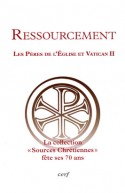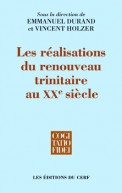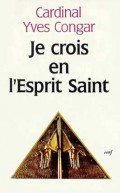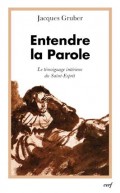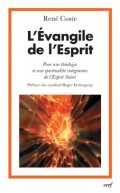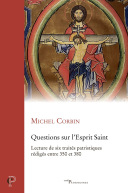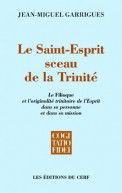
La Relation de l'Esprit Saint au Christ - CF 274
Collection Cogitatio Fidei - N° 274
416 pages - sept. 2010
42,90€
Le regain d'intérêt qu'a connu la théologie trinitaire, au XXe siècle, a porté un fruit particulièrement fécond en christologie grâce à une meilleure compréhension de la place que l'Esprit occupe dans sa relation au Christ. Dans la Trinité, l'ordre Père, Fils, Esprit signifie un rapport de principe entre les trois personnes divines et ne doit pas conduire à donner de l'Esprit une figure appauvrie ou simplifiée, de tierce position. Bien au contraire, le Nouveau Testament souligne la complexité et la richesse du rapport entre le Christ et l'Esprit. Une différence existe entre la situation avant Pâques et le temps à la suite de la résurrection. Avant Pâques, l'Esprit repose sur le Christ, révèle sa filiation divine de manière essentielle, et conduit le Christ dans son désir et son accomplissement de la volonté du Père. Après Pâques, le Christ souffle l'Esprit sur les apôtres, l'Esprit est envoyé par le Père au nom du Fils (voir Jn 14, 26), et par le Fils d'auprès du Père (voir Jn 15, 26). L'étude de la relation de l'Esprit au Christ, parfois nommée christologie pneumatique, doit-elle alors prendre le pas sur le traité classique du Verbe incarné ? En relisant l'œuvre d'Yves Congar (1904-1995), il est possible de donner une réponse originale et qualifiée à cette question, et d'en percevoir aussi les applications concrètes. À travers l'œcuménisme et l'ecclésiologie, Congar a été conduit à penser de manière nouvelle le rapport entre le Christ, l'Esprit et l'Église. On y trouve un principe unificateur qui permet d'interpréter de manière cohérente et organique son œuvre considérable. Jointe aux contributions d'autres théologiens, sa réflexion nous permet de situer la christologie pneumatique, non en rivalité avec le traité du Verbe incarné, ce qui, au fond, n'aurait pas vraiment de sens, mais, plus utilement, de la comprendre comme nécessaire à l'élaboration d'une christologie pleinement trinitaire. Surtout, avec Congar, on peut montrer que la mise en valeur de la place de l'Esprit-Saint dans la vie du Christ favorise une meilleure prise en compte de l'humanité et de l'existence historique de Jésus, propre à nourrir la quête contemporaine d'une authentique vie spirituelle.
--
The renewed interest in Trinitarian theology in the 20th century was particularly fruitful in terms of Christology, thanks to a better comprehension of the Spirit’s place in its relation with Christ. In the Trinity, the order Father, Son and Spirit signifies a relation of principle between the three divine persons and must not lead us to see the Spirit as a poor or simplified figure, in third position. On the contrary, the New Testament insists on the complexity and richness of the relation between Christ and the Spirit. There is a difference between the situation before Easter and the time after the Resurrection. Before Easter, the Spirit reposes on Christ, reveals his divine filiation in an essential manner, and leads Christ in his desire and accomplishment of the Father’s will. After Easter, Christ breathes the Spirit into the apostles, the Spirit is sent by the Father in the name of the Son (see Jn 14, 26), and by the Son with the Father (see Jn 15, 26). Should the study of the relation between Christ and the Spirit, sometimes called pneumatic Christology, always take precedence over the classic treatise of the Word made flesh? By rereading Yves Congar (1904-1995), it is possible to give an original and informed response to that question, also to observe concrete applications. Through ecumenism and ecclesiology, Congar came to think the relation between Christ, the Spirit and the Church in a new way. We find a unifying principle that lets us interpret his substantial work in a coherent and organic manner. Added to the contributions of other theologians, his reflection allows us to situate pneumatic Christology, not as a rival of the treatise of the Word incarnate, which would be absurd, but more constructively to understand it as necessary to elaborate a Christology that is fully Trinitarian. With Congar in particular, we can see that highlighting the Holy Spirit’s place in the life of Christ leads to a better understanding of Jesus’s historical and human existence, which is likely to nourish the contemporary quest for an authentic spiritual life.
--
The renewed interest in Trinitarian theology in the 20th century was particularly fruitful in terms of Christology, thanks to a better comprehension of the Spirit’s place in its relation with Christ. In the Trinity, the order Father, Son and Spirit signifies a relation of principle between the three divine persons and must not lead us to see the Spirit as a poor or simplified figure, in third position. On the contrary, the New Testament insists on the complexity and richness of the relation between Christ and the Spirit. There is a difference between the situation before Easter and the time after the Resurrection. Before Easter, the Spirit reposes on Christ, reveals his divine filiation in an essential manner, and leads Christ in his desire and accomplishment of the Father’s will. After Easter, Christ breathes the Spirit into the apostles, the Spirit is sent by the Father in the name of the Son (see Jn 14, 26), and by the Son with the Father (see Jn 15, 26). Should the study of the relation between Christ and the Spirit, sometimes called pneumatic Christology, always take precedence over the classic treatise of the Word made flesh? By rereading Yves Congar (1904-1995), it is possible to give an original and informed response to that question, also to observe concrete applications. Through ecumenism and ecclesiology, Congar came to think the relation between Christ, the Spirit and the Church in a new way. We find a unifying principle that lets us interpret his substantial work in a coherent and organic manner. Added to the contributions of other theologians, his reflection allows us to situate pneumatic Christology, not as a rival of the treatise of the Word incarnate, which would be absurd, but more constructively to understand it as necessary to elaborate a Christology that is fully Trinitarian. With Congar in particular, we can see that highlighting the Holy Spirit’s place in the life of Christ leads to a better understanding of Jesus’s historical and human existence, which is likely to nourish the contemporary quest for an authentic spiritual life.
- Dimensions : 135x215x20
- ISBN : 9782204091381
- Poids : 490 grammes
DU MÊME AUTEUR
Les Réalisations du renouveau trinitaire au XXe siècle - CF 273
352 pages - avril 2010
Que sert à l'homme de gagner l'univers ?
La vie religieuse à l'écoute de saint Marc
de François-Marie Humann
240 pages - mai 2023
> VOIR TOUS LES LIVRES DE l'AUTEUR
DANS LA CATÉGORIE THÈMES DOCTRINAUX
Questions sur l'Esprit Saint
Lecture de six traités patristiques rédigés entre 350 et 380
de Michel Corbin
448 pages - nov. 2024

